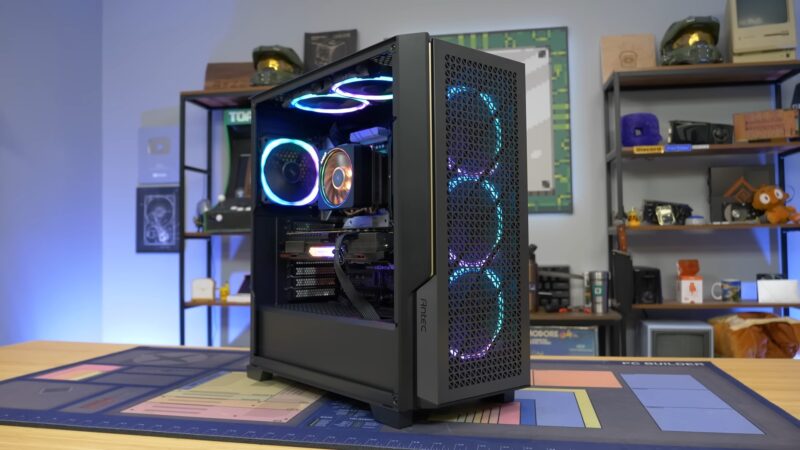CPUs are central processing units, or CPUs, in computer systems. The CPU performs the basic arithmetic and logical operations of a computer system.
It is also responsible for controlling the flow of information between the different parts of the system. CPUs are found in desktop and laptop computers and embedded systems.
CPUs are the brains of your gaming rig. They handle the math and processing that keeps your games running smoothly.
Without a good CPU, you might not be able to play your favourite games or see much of a performance improvement.
So what are some of the best CPUs for gaming? Here are five of the best CPUs for gaming on the market today.
How Much Difference Does A CPU Make In Gaming?
In recent years, CPUs have become more critical in gaming. CPUs are the brains of a gaming computer, handling calculations and controlling all the other hardware.
So how much difference does a CPU make in gaming? It depends on the game and what type of CPU you’re using.
For example, some games require more powerful cores to run smoothly, while others can play others on a lower-power processor without any problems. It depends on the game.
CPUs are essential in gaming because they speed up calculating and rendering graphics. CPUs can also handle complex mathematical calculations, so they are so important in video games.
However, not all CPUs are created equal. Some CPUs are more powerful than others, which can make a big difference in gaming performance.
Will Upgrading The CPU Improve Gaming Performance?
Gaming performance has become increasingly important as the industry continues to grow. Many gamers are looking for ways to improve their gaming experience, and upgrading their CPU is one option that is often considered.
However, there is no surefire way to determine which CPU will improve gaming performance.
There are several factors to consider when making a decision, including the type of game being played and the hardware requirements.
Upgrading your CPU can be a daunting task, but it can be an easy and cost-effective process with some careful consideration. Here are some factors to consider when upgrading your CPU:
- What type of CPU are you using?
- What cores do you need?
- How much power do you need?
- Is it time for a new CPU?
- Do your funds permit it?
Which One Between The GPU And The CPU Does The Most Work While Gaming?
PC gamers have long debated which one between the GPU and the CPU works most while gaming. Recent studies, however, suggest that it may not be as clear-cut as once thought.
A new study conducted by scientists at the University of Illinois at Chicago has found that the GPU performs more work than the CPU while gaming.
The study used a custom-built gaming platform to measure how much work each part of the system was doing during various gaming scenarios.
Since the graphics processing unit (GPU) handles the graphics tasks in a game, it’s often thought that the GPU is the one that does the most work while gaming.
That’s not always the case, though. It turns out that the central processing unit (CPU), which performs all of the mathematical operations necessary to generate images on a screen, is more critical when it comes to gaming.
Does the CPU affect FPS?
Yes, the CPU does affect FPS (frames per second) in gaming and other graphics-intensive applications. The CPU (Central Processing Unit) is responsible for executing game logic, artificial intelligence, physics calculations, and handling input/output operations. These tasks are crucial for running games smoothly and efficiently.
If your CPU is not powerful enough, it can create a bottleneck in your system, limiting the performance of your GPU (Graphics Processing Unit) and causing lower FPS. In this case, even if you have a high-end GPU, your gaming experience may suffer due to the CPU’s limitations. To achieve the best gaming performance, it’s essential to have a balanced system with both a powerful CPU and GPU.
Does The CPU Effect The Gaming Performance In A PC Or Only The GPU?
Gaming performance is one of the most important factors when choosing a computer. Some people think that the CPU only affects gaming performance, but that’s not always the case.
In this article, we will be looking at whether or not the CPU affects gaming performance.
We will be comparing three different computers: one with a powerful CPU, one with a weak CPU, and one with no CPU.
We will be doing this by running the popular game The Witcher 3 on all three computers.
How Much Does A CPU Affect Gaming Performance?
CPUs play a critical role in how fast a gaming computer can process graphics and other tasks. So, how much of a difference does a good CPU make?
Unfortunately, there is no definitive answer to this question. The amount of a CPU’s impact on gaming performance depends on the specific game being played and the settings used.
However, generally speaking, a better CPU will improve faster game performance. However, measuring the CPU’s impact on gaming performance can be difficult.
This is because different games require different levels of CPU processing power. Moreover, the performance of a computer’s CPU can also vary depending on the hardware and software configuration.
How The CPU Affects Your Gaming Experience
The central processing unit (CPU) is the heart of your computer. It’s responsible for executing the commands that you give it, and it’s also in charge of keeping track of what’s happening on your screen.
That means that the CPU affects your gaming experience in a big way. Here are five ways:
- Processing Game Logic: The CPU is responsible for executing complex game logic, which includes handling AI, physics, and game mechanics. A powerful processor can help maintain a consistent frame rate and prevent slowdowns during intense moments, ensuring that your gameplay remains fluid and enjoyable.
- Managing Background Tasks: While gaming, your computer continues to run background tasks, such as managing your operating system, antivirus, and other software applications. A capable CPU can efficiently manage these processes without causing interruptions or performance drops in your gaming sessions.
- Facilitating Smooth Multiplayer Experiences: In multiplayer games, the CPU plays a crucial role in managing network communications and processing data from other players. A high-performing processor can help reduce lag, ensuring seamless and enjoyable interactions with fellow gamers in online matches.
- Delivering Faster Load Times: A powerful CPU can speed up load times for games, allowing you to jump into the action quickly and reduce waiting periods. This is particularly beneficial for games with large, open-world environments or frequent loading screens.
- Future-proofing Your Gaming Rig: As game developers continue to push the boundaries of what’s possible in terms of graphics and gameplay, having a robust CPU ensures that your gaming rig can handle the latest titles without the need for frequent upgrades. Investing in a powerful processor today will help you enjoy a consistently smooth gaming experience for years to come.
Can CPU Temperature Affect Gaming?
There is no clear answer regarding whether or not CPU temperature can affect gaming performance.
Some say that a higher CPU temperature can make games run smoother, while others claim that a too-hot CPU can cause damage to the computer’s hardware.
Ultimately, it’s up to the individual gamer to decide if they feel their system is running more smoothly when their CPU is hotter or more relaxed.
CPU temperature affects gaming performance in some ways:
- It can affect how well the processor can handle rendering graphics or calculating data.
- CPU temperature can also affect how quickly the processor can respond to game commands.
- High CPU temperatures can degrade gaming performance and even cause the computer to overheat.
- CPU temperature also impacts the processor’s lifespan and its ability to provide consistent performance.
Is 100% CPU Usage Harmful To Gaming?
One of the most common questions asked by PC gamers is, “is 100% CPU usage harmful to gaming?”. The short answer is that there is no definitive answer, but in general, using all available CPU cores can result in smoother gameplay and reduced lag times.
This is especially true if the game requires a high graphics processing power. However, if your computer isn’t equipped to handle 100% CPU usage, you may experience reduced FPS or other performance inconsistencies.
Intel processors run at around 100 degrees Celsius, but what does that mean for the gaming experience?
Should gamers worry about overheating their CPUs, and what can they do to prevent it? Desktop CPUs are designed to remain stable at 100 degrees Celsius, but laptop CPUs may not be as sturdy.
Some gamers swear by overclocking their CPUs to increase performance, but others say doing so can cause overheating and damage.
Steps to Improve Performance
1. Eliminate CPU bottlenecks
Unfortunately, there are no immediate solutions to a CPU bottleneck since it arises from a performance disparity between the CPU and your GPU. However, there are a few tweaks you can try for a marginal improvement. For a significant fix, consider upgrading your CPU if the issue is severe. If it isn’t, and you’re just looking to optimize your already decent performance, you can:
2. Close background programs:
Your CPU needs to focus on your primary task, which is likely gaming in this case. Press Ctrl+Shift+Esc together to open the Task Manager, which allows you to manage running tasks and free up resources on your computer. Be cautious when closing programs, as shutting down essential processes may crash your system. Instead, look for programs you recognize and assess whether they need to be open. Additionally, uninstall any unused applications to reduce CPU workload.
3. Check for viruses:
High CPU usage in the background could be due to your computer being infected with viruses. Ensure your computer is protected with a reliable antivirus program, such as Kaspersky, to prevent malware from impacting your CPU’s performance.
4. Adjust in-game settings:
Most graphical settings in games affect GPU performance, but some settings, such as population density, quick sync, floating-point, and draw distance, impact the CPU workload. Look for settings that influence the number of objects on-screen or the physics of their movement in the game’s 3D space. Tweaking or reducing these settings can lead to a significant improvement in performance.
5. Be aware of CPU-intensive games:
Modern fast-paced games, including first-person shooters (FPS), multiplayer games, open sandbox games, and more, are designed to take advantage of the latest CPUs with multiple cores and threads. For competitive players using high-refresh-rate monitors, some games even recommend high-performance CPUs like the Intel Core i7-8700K or AMD Ryzen 1800X. Keep in mind that demanding games may require a more powerful CPU for optimal performance.
6. Use a high-refresh-rate monitor:
To enhance your gaming experience further, consider using a 240Hz monitor, which can provide smoother gameplay and better responsiveness.
FAQs
What is the ideal CPU temperature for gaming?
A: The ideal CPU temperature for gaming varies depending on the specific CPU model and manufacturer’s recommendations. Generally, keeping your CPU temperature between 60°C and 80°C is considered safe for gaming. However, it’s always a good idea to consult your CPU’s documentation for specific temperature guidelines.
How do I check my CPU usage while gaming?
A: To check your CPU usage while gaming, open the Task Manager by pressing Ctrl+Shift+Esc on your keyboard. Click on the “Performance” tab, and you will see your CPU usage displayed as a percentage.
Is it better to have more cores or higher clock speed for gaming?
A: Both the number of cores and clock speed are essential factors for gaming performance.
However, modern games increasingly benefit from multiple cores, as they can handle various tasks simultaneously.
In general, a balance between the number of cores and clock speed is ideal for gaming.
Do games benefit more from hyperthreading?
A: Hyperthreading is a technology that allows each CPU core to handle two threads simultaneously, effectively doubling the number of available cores.
Some games benefit from hyperthreading, while others do not see a significant performance improvement.
It largely depends on how the game is designed and optimized for multi-core processing.
Should I overclock my CPU for better gaming performance?
A: Overclocking your CPU can potentially improve gaming performance by increasing the processor’s clock speed.
However, it also increases the risk of overheating and can shorten the CPU’s lifespan.
Overclocking should only be done if you are familiar with the process and have adequate cooling solutions in place.
Always proceed with caution and at your own risk.
How can I monitor my CPU and GPU temperatures while gaming?
A: You can monitor your CPU and GPU temperatures using third-party software like HWMonitor, MSI Afterburner, or NZXT CAM.
These programs provide real-time temperature readings and can often be customized to display the information on-screen while gaming.
Does The Number Of Cores In A Cpu Affect Gaming Performance?
There is some debate about whether or not the number of cores in a CPU affects gaming performance.
Some believe that more bodies will give you a better overall gaming experience, while others claim there is no significant difference between processors with 4 and 8 cores.
The truth may lie somewhere in the middle, but either way, you should be able to get a good gaming experience with any processor that has at least 2 cores.
Does the number of seats on a CPU affect gaming performance?
Some people believe that more bodies result in better gaming performance, while others believe that the number of cores does not have a significant impact.
This article will discuss the pros and cons of having more or fewer cores in a CPU and whether or not they affect gaming performance.
How Many Cores Do I Need For Gaming?
If you want to game on high settings, or if you’re going to use several programs simultaneously, you’ll need a Core i5.
However, if all you want is to browse the web and watch some videos, then a Core i3 will do just fine. So which one should you buy? Well, that depends on what you plan on using your computer for.
Does The Cpu Cache Affect Gaming Performance?
Cache, or more accurately, the processor’s cache, is a small buffer of data that can help to speed up system performance.
Some people believe that the cache affects gaming performance, while others claim that the cache does not affect gaming performance.
This article will explore whether or not the cache affects gaming performance and provide some evidence to support either side of the argument.
Conclusion
Gaming has come a long way since the days of playing Pac-Man on a primary Atari console.
Nowadays, gamers can enjoy sophisticated and graphically-rich games on high-end hardware, thanks to the power of CPUs.
However, is the CPU that important when it comes to gaming? Some experts say no, while others insist that a powerful CPU is essential for optimum performance. So which is it – does CPU affect gaming, or not?
Related Posts:
- Does CPU Affect FPS - Unlock Your Gaming Potential
- Does CPU Affect Download Speed - Why Your Processor…
- Does Motherboard Affect FPS? - Learn Quickly In 2024
- How To Check Does My Laptop Have HDMI Input? - HDMI…
- Is Fortnite A CPU Or GPU Game? 2024 - Choose The…
- What Is HEDT CPU? - 15 Best CPUs for Gaming, Video…














